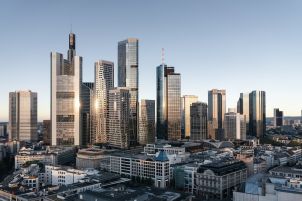Sustainable real estate to reduce carbon footprint
As the largest emitter of CO2, accounting for 39% of global emissions, and more than a third of global final energy consumption, the real estate sector is a key player in the fight against global warming. With carbon neutrality in 2050 as a key target set by the Paris Agreement in 2015, real estate is becoming increasingly concerned by becoming green or sustainable. But what do the concepts of green or sustainable real estate really mean?
"Sustainable real estate is real estate in which we take into account specific criteria, and not just financial but also extra-financial. This means that environmental, social and governance criteria are evaluated, monitored, and we try to always improve them. So we talk about the energy performance of the buildings, the well-being of the users in the building, if there are features related to biodiversity. That's how we define sustainable real estate today," explains Nehla Krir.

Sustainable real estate investment, what’s the benefit?
At the heart of sustainable real estate are environmental, social and governance (ESG) criteria, which generally constitute the three pillars of extra-financial analysis, taken into account in the socially responsible management of companies. "Today, it is no longer just a matter of getting a quick return on investment. It is now absolutely necessary to integrate ESG criteria where we invest. We believe that ESG is now driven by three key factors. First of all, there are the convictions of investment managers, like with BNP Paribas REIM. Then there are the regulations that push and encourage all these aspects in the building, whether in the architecture or in the financial product. The third key factor is investor demand," says Nehla Krir.
She adds, "So today, investors are really focusing on sustainable performance. They systematically want the investment manager to integrate ESG criteria when they select buildings, when they manage an asset and even when they sell the property. So it's becoming more and more important, more and more essential, and now we're trying to demonstrate what the positive financial impacts of this is. We know there is a positive environmental impact when we reduce carbon emissions, and now we are trying to demonstrate what the positive financial impacts are for investors."


Today, it is no longer just a matter of getting a quick return on investment. It is now absolutely necessary to integrate ESG criteria where we invest.
What are the impacts of green real estate on the city of today and tomorrow?
For Nehla Krir, all actors, private and public, must now integrate ESG criteria in order to have a real impact. In addition to reducing pollution and greenhouse gas emissions, sustainable real estate has many positive effects, such as increased transparency and improved well-being. "There is a cost for buildings to improve energy efficiency. By changing the lighting system, the heating system, the cooling system there is a cost to improve the technology and reduce the obsolescence of buildings, "says Nehla Krir.
Like METAL 57, a demonstrator of BNP Paribas Real Estate's expertise, which has received numerous environmental certifications such as BREEAM and HQE Exceptional Level, Nehla Krir also points out that sustainable real estate "has an impact in terms of rental income. You can see a 5% improvement in rental income and a 5% reduction in operating costs. So, it’s an investment to have a very efficient building it will certainly have an impact on potential value, whether it's for rental income or building expenses."
Source: 2019 global status report for buildings and construction, International Energy Agency, December 2019
-
 Episode 6
Episode 6Rethinking urban transportation through the prism of new uses
-
 Episode 7
Episode 7The changing landscape of real estate investment
-
 Episode 8
Episode 8What is the e-office?




